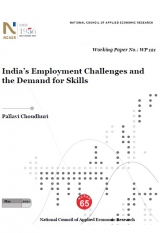India's Employment Challenges and the Demand for Skills
Pallavi Choudhuri
May 2021
Over the last two decades, less than half of the Indians who sought jobs actually got them, with many more millions set to enter the job market over the next two decades. Despite extensive unemployment and under-employment, however, there is a growing shortage of skilled workers. One of the ways to address this skills shortage is to train unemployed youth and those who have dropped out of the labour market by imparting them the skills they lack, focusing on higher levels of both cognitive and non-cognitive skills that can enhance the adaptability and employability of workers. Another route is to formally recognise workers with skills acquired through informal and non-formal learning, and enhance the skills of such workers by providing them potential pathways into the formal labour market. A third route is to incentivise on-the-job training, not only in large firms, but also in micro, small, and medium industries (MSMEs), and building greater awareness on the returns to skilling. While the focus of policy makers has been on the creation of jobs, which is a daunting challenge, there is also need for discussions on job creators or entrepreneurs, and on the key skills that can equip more labour market aspirants and the existing workers to become job providers /opportunity entrepreneurs. As production processes have increasingly become more automated, the challenge is to impart transferable skills to workers that can enable them to ride through the wave of automation, and any resulting structural shifts in the labour market. A growing and related challenge is also to address the issue of women’s participation in the workforce. This necessitates not only a rethinking of ways to create appropriate jobs for women, but also equipping more women with the requisite life skills, while also training women to be able to work in both the skill-intensive and capital-intensive sectors in addition to the labour-intensive industries.
Trade, Technology and Skills







